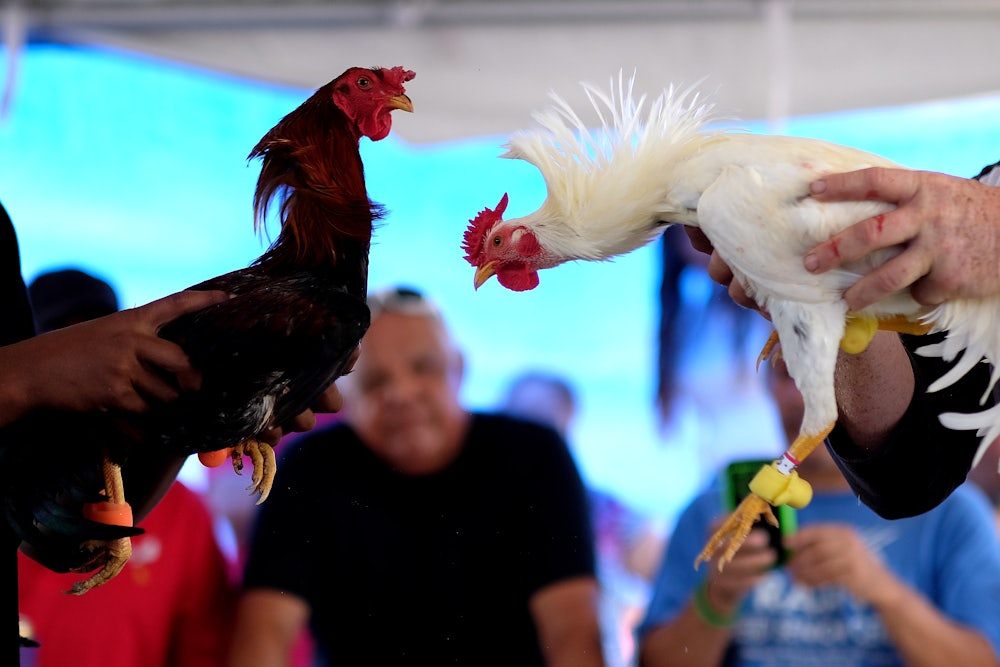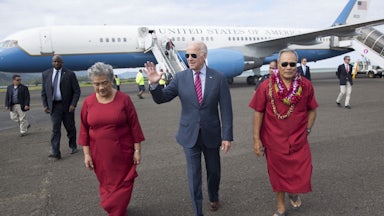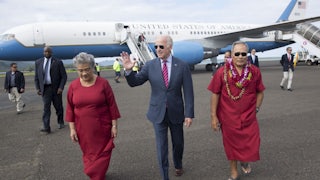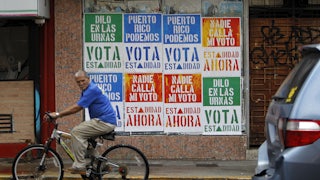The United States of America is this country’s formal name, but it would be slightly more accurate to call it the United States and Territories of America. Roughly 3.6 million people live on American soil but not in the 50 states or the District of Columbia—a population greater than that of 22 states individually and the five least populous states collectively. The overwhelming majority of them hail from Puerto Rico, a semiautonomous commonwealth in the Caribbean where 3.2 million Americans live.
What does “semiautonomous” mean for that island’s governance? The question has increasingly vexed Puerto Rico’s residents, the federal government, and the Supreme Court. Now a potential case before the justices has reframed the question in unusual terms: whether Congress can ban cockfighting within Puerto Rico. “With barely a thought as to whether cockfighting substantially affects interstate commerce, Congress overrode Puerto Rico’s sovereign decision, stripping the island of its culture and heritage,” the plaintiffs in the case told the court in their petition for certiorari. “All it took was two pages inserted into the omnibus farm bill. This is not how our federal system should work.”
The case, Ortiz-Díaz v. United States, highlights Puerto Rico’s unusual position in the American constitutional firmament. At issue in the case is the Agriculture Improvement Act of 2018, one of the periodic farm bills passed by Congress. One of its provisions, Section 12616, substantially changed federal laws that banned cockfighting. Previous versions of federal legislation on the issue were carefully written to avoid prohibiting the practice in Puerto Rico: A 1976 law only banned it if the animals crossed state lines, while a 2008 revision imposed a nationwide ban unless the sport was permitted by local law.
Section 12616 eliminated that exception. Animal rights groups that view cockfighting as a cruel bloodsport applauded Congress’s decision. But the move prompted an outcry from Puerto Rico’s leaders, including then-Governor Ricardo Rosselló, who flew to Washington in a last-minute bid to lobby against it personally. (Since it is not a state, Puerto Rico does not have voting members of Congress.) Section 12616 also drew obvious protests from those whose livelihoods depend on cockfighting. By some accounts, cockfighting is a multimillion-dollar industry on the island that reportedly employs around 20,000 people through direct and indirect means.
One of them is Ángel Manuel Ortiz-Díaz, the named plaintiff in a federal lawsuit filed in 2019 by Puerto Rico’s cockfighting industry to challenge Section 12616 on multiple constitutional grounds. A federal district court judge ruled in favor of the federal government later that year, concluding that the law fell under Congress’s power to regulate interstate commerce. So did a three-judge panel in the First Circuit Court of Appeals, which affirmed the lower court’s decision on similar grounds. Both courts pointed to Supreme Court precedents that take an expansive view of what amounts to “interstate commerce.”
In his petition, Ortiz-Díaz argued that cockfighting in Puerto Rico is too localized to justify Congress’s intervention. His argument drew heavily from the court’s conservative wing and its skepticism of the Commerce Clause’s current boundaries. One of the most frequently criticized cases on the right is Wickard v. Filburn, a New Deal–era case in which the court ruled against a farmer who violated federal wheat production limits to grow additional feed for his cattle. The justices upheld the law under the Commerce Clause, even though the farmer hadn’t sold or traded the wheat, concluding that his activities could still have a “substantial effect” on interstate commerce.
The Supreme Court has not repudiated or overturned Wickard, though it did impose some limits on the Commerce Clause in a series of landmark cases under former Chief Justice William Rehnquist in the 1990s. Ortiz-Díaz argued that the justices should go even further in this case. “The constitutionality of the ‘substantial effects’ test is suspect,” he wrote, citing a concurring opinion in one of those cases by Justice Clarence Thomas. As the court’s leading critic of broad readings of the Commerce Clause, Thomas was an outlier among the justices for most of his tenure. Whether his views are shared by the rest of the court’s bolstered conservative wing remains to be seen.
“As Justice Thomas presciently recognized, an unbounded Commerce Clause would empower the Federal Government to regulate purely local affairs like ‘marriage, littering, or cruelty to animals,’” Ortiz-Díaz argued, emphasizing the latter point. “That is exactly what happened here. The First Circuit found that Congress had the power to criminalize cockfighting regardless of whether the bird, the person, or anything else travels to or from the islands. This is wholly inconsistent with our federal system. The Commerce Clause does not give the federal government this ‘general power of governing’ all aspects of our daily lives.”
In July, the Puerto Rican government filed a friend of the court brief in favor of Ortiz-Díaz’s argument, arguing that there was “no rational basis” to believe that cockfighting on the island had an interstate effect. “First, in approving Section 12616, Congress did not even address the matter of whether such activity affects interstate commerce,” Puerto Rico argued. “Second, cockfighting is not a good that may affect the interstate market; rather, it is an activity that may not be exported. Third, since cockfighting had been illegal in all states at the time when Section 12616 was approved, there was no substantial interstate market to consider. Fourth, Puerto Rico law clearly and strictly limits this activity to gamecocks born and bred in Puerto Rico.”
The federal government, which urged the justices to reject the petition, countered that cockfighting in Puerto Rico was far from a local affair. “A congressional report in 1976 found that animal fights ‘attract fighting animals and spectators from numerous states,’ are ‘advertised in print media of nationwide circulation,’ and ‘often involve gambling,’” the Justice Department told the court in its own brief. It also made a point that may be far more salient to the justices than it would have been a few years ago. “Members of Congress also have noted that cockfights can affect commerce by contributing to the spread of diseases such as avian influenzas,” the department noted.
Even if the justices take a narrower view of the Commerce Clause, however, the federal government also argued that Congress acted well within its powers to regulate territorial affairs. The Constitution’s Territory Clause gives Congress the broad authority to “make all needful rules and regulations” within U.S. territories that aren’t part of a state, and the Supreme Court has previously held that this power is analogous to those held by state governments to pass their own laws within the federal system. Under that reasoning, the Justice Department argued, Congress could ban cockfighting within Puerto Rico even if it could not do so under the Commerce Clause within the 50 states.
Puerto Rico and many of its top officials say the Territory Clause argument is part of the problem: It maintains an inequitable status quo between 3.2 million Americans who have unique statelike powers for self-government and a federal government that can override them on a whim. “The imposition of Section 12616 on Puerto Rico’s intrastate practice and tradition of cockfighting goes against the local and internal self-government recognized and agreed between Congress and the people of Puerto Rico, in a process that occurred from 1950 to 1952, and that is still in force today,” the Puerto Rico Senate argued in its own brief, claiming that the commonwealth should be viewed akin to a state in this case.
More broadly, the case also highlights how colonialism continues to shape Puerto Rico, its basic governance, and its cultural heritage. “As more than adequately explained in [Ortiz-Díaz’s] brief, cockfighting events in Puerto Rico are not economic activities that in any way affect the ebb and flow of interstate commerce but rather a deeply engrained cultural tradition embedded in Puerto Rican ethos for almost half a millennium,” Rafael Hernández-Montañez, the speaker of the commonwealth’s House of Representatives, told the court.
The justices are already slated to hear a notable case on Puerto Rico’s unusual legal status this term. In U.S. v. Vaello-Maduro, the court will consider whether Congress violated the Fifth Amendment by excluding U.S. citizens who live in Puerto Rico and some other U.S. territories from Social Security’s disability insurance program. If those citizens lived in Alaska, Hawaii, New York, or Texas, they would be able to use the program. But by virtue of residing in Puerto Rico, otherwise eligible Americans are barred from these benefits. That raises uncomfortable questions about whether Americans can effectively become second-class citizens based on where they live within American borders.
The Supreme Court has turned away other recent pleas to protect cultural traditions in the territories from mainland threats. Earlier this year, American Samoa asked the justices to strike down a federal fisheries rule that it claimed would violate agreements made between Indigenous leaders and the federal government when the country acquired it in the early twentieth century. The justices turned down the opportunity to intervene in late June and effectively let the rule stand. Even if the court doesn’t take up this case on Puerto Rico sovereignty, however, the deeper dilemma about the island’s relationship with the rest of the U.S. is far from over.








